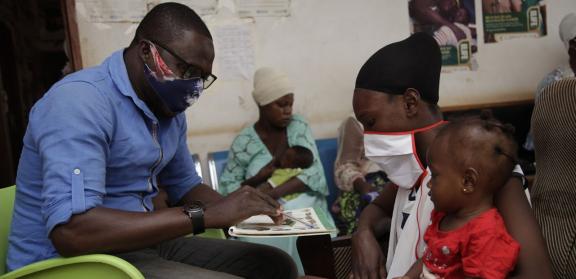
Global Micronutrient Deficiency Estimates
For decades, the number of people world wide experiencing micronutrient deficiencies has been estimated at 2 billion. The methods used to arrive at this estimate are unclear and the data are now outdated. USAID Advancing Nutrition, in collaboration with consortium partner GAIN, and an advisory panel of experts managed by the Micronutrient Forum, published a paper in the Lancet Global Health to revise this estimate of micronutrient deficiencies and provide a transparent methodology for updating the estimate as needed. The project used existing biomarker data from nationally representative surveys to estimate that 1.2. billion non pregnant women ages 15-49 and 372 million children under five experience deficiency of at least one micronutrient.
Hemoglobin Measurement
USAID Advancing Nutrition’s HEME working group developed a protocol for understanding how, in a laboratory setting, the blood specimen (single drop vs. pooled capillary) and devices (various models of the HemoCue) affect hemoglobin measurement. Known as the HEmoglobin MEasurement (HEME) laboratory validation study, the project awarded five grants to research institutions to implement the protocol in Cambodia, Guatemala, Lebanon, Nigeria and Tanzania. Nutrition International implemented the protocol in a sixth site in Ethiopia. Preliminary results from this study were shared via a webinar in May 2023 and at the Micronutrient Forum Global Conference in October 2023.
Anemia Measurement, Assessment, and Interventions
The USAID Advancing Nutrition Anemia Task Force (ATF), a panel of anemia experts, is developing a comprehensive overview of anemia: what has been done, what we are uncovering now, and what we can do to reach the World Health Assembly goals for reducing anemia. The ATF will adopt an ecological approach that includes an appreciation of systems biology: understanding the biological mechanisms underpinning various causes of anemia, translation of knowledge of biology within sensitive and specific assessment methodologies and interventions, which ultimately improve clinical and public health outcomes. Read more about the ATF.
Food Fortification and Supplementation
USAID Advancing Nutrition is building on evidence generated through USAID investments in Uganda’s fortification and supplementation programs by publishing findings that show that mandatory fortification of maize flour, most of which is produced by small-scale producers, is financially unsustainable. These findings are based on two notable investments in implementation research—one on micronutrient powder (MNP) supplementation, and the other on small-scale maize flour fortification—that are key to current policy discussions in Uganda. In the first investment, the USAID-funded SPRING project collaborated with the Ministry of Health in Uganda to pilot a district-wide distribution of MNP to all children ages 6 to 23 months in Namutumba District. The pilot provided MNP from February to November 2016 to health facilities and households through outreach programs. Although SPRING collected data on the costs of distributing through these two channels, the data have not been published. In the second instance, the SPRING project conducted a cost analysis of small-scale maize flour fortification in Uganda in partnership with the MOH and the Ministry of Trade Industry and Cooperatives. See the published paper, “Comparing costs and cost-efficiency of platforms for micronutrient powder (MNP) delivery to children in rural Uganda.”
USAID Advancing Nutrition also held a webinar in July on improving diets through innovative data analysis and modeling of food fortification, analyzing the Malawi Integrated Household Survey (IHS) as a case study. During this event, panelists shared the results of an analysis of the Fourth Malawi IHS, or IHS4, conducted by USAID Advancing Nutrition and MAPS. They also reflected on the findings as they relate to the MAPS project overall, USAID’s efforts to support context-specific approaches to improving nutrient intake, and efforts in Malawi to bolster support for national and local-level decision-making aimed at decreasing nutrient deficiencies. See the published paper, "Modeling Food Fortification Contributions to Micronutrient Requirements in Malawi Using Household Consumption and Expenditure Surveys."